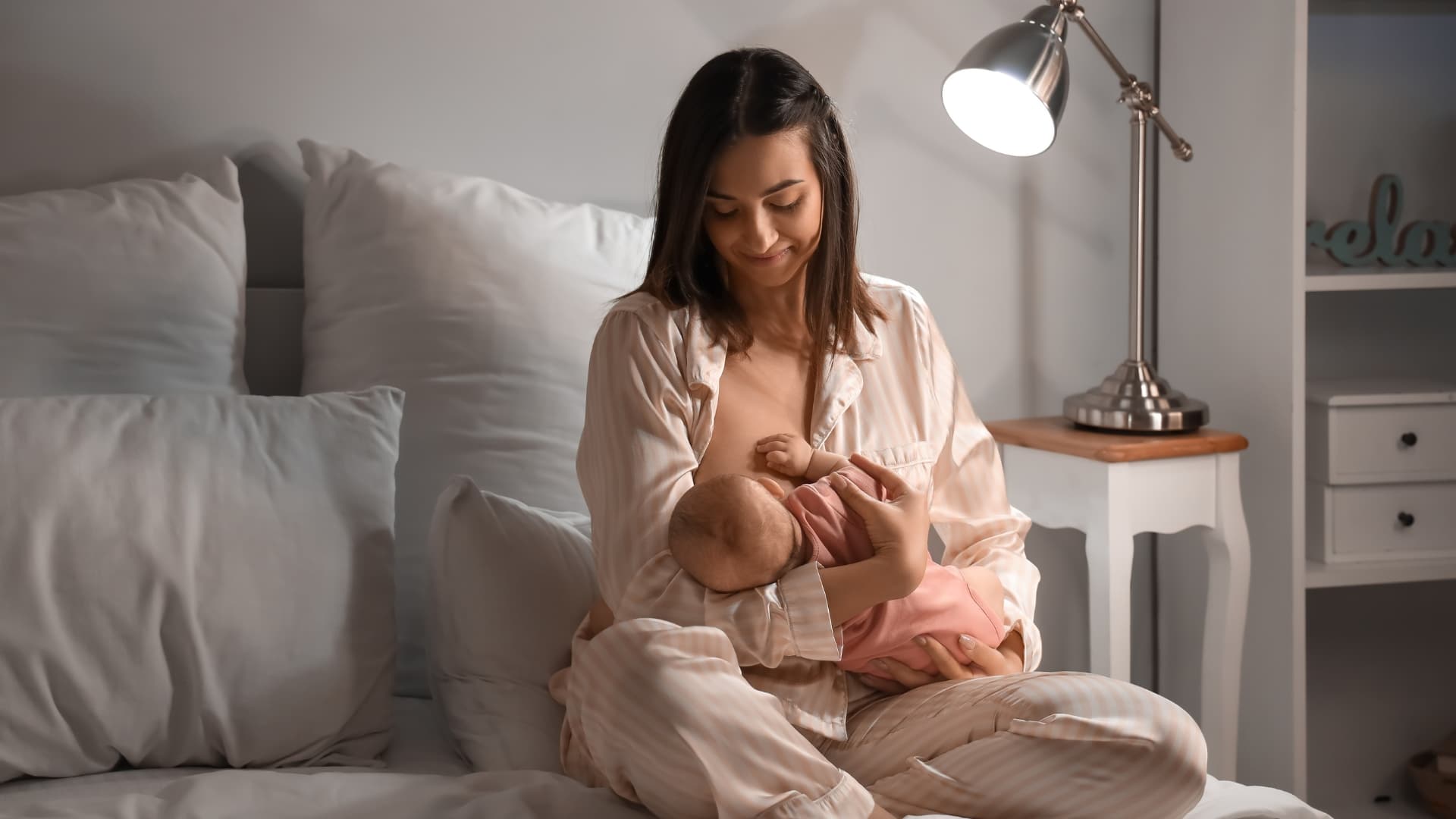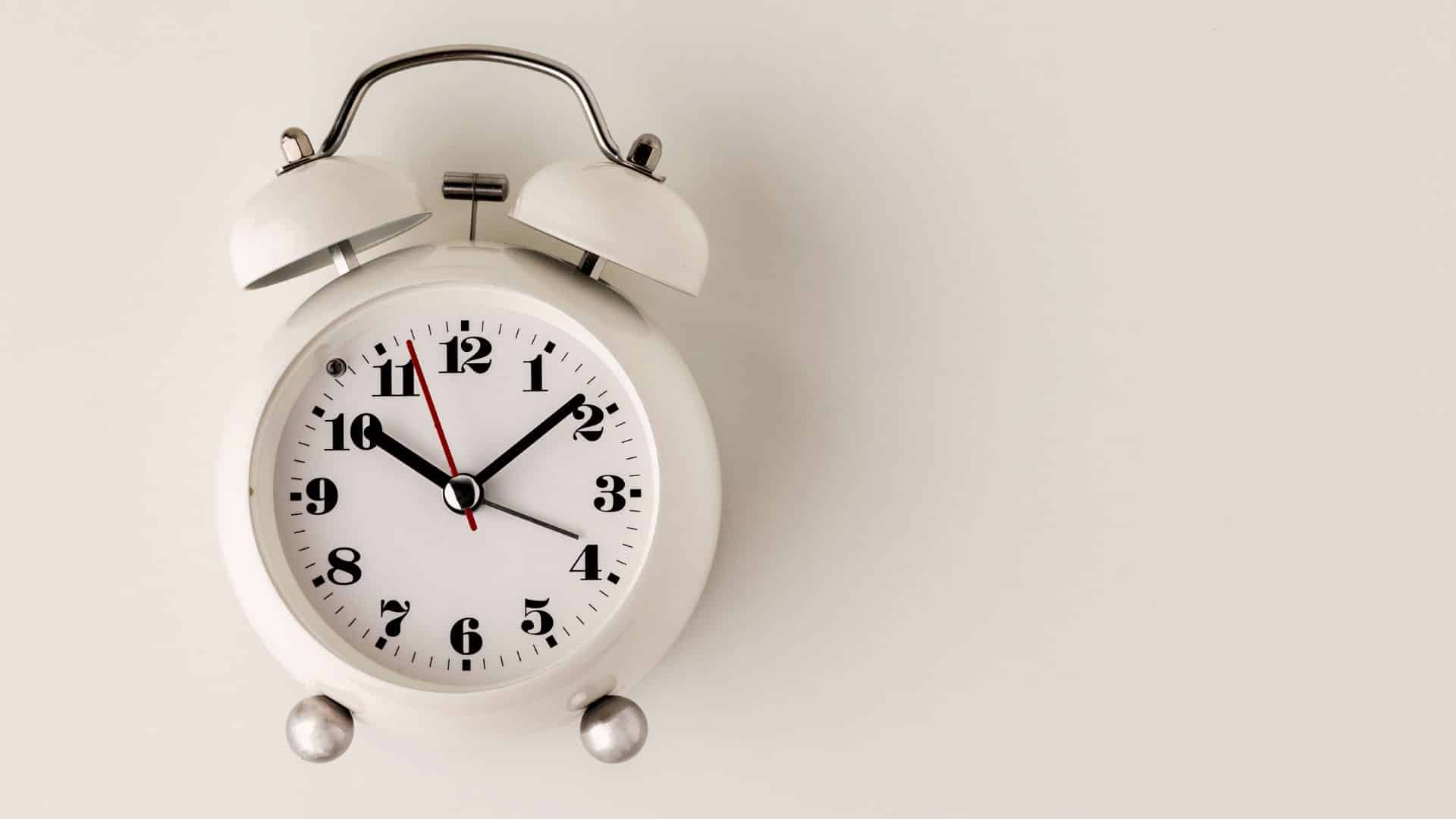It is highly recommended by trusted authorities and experts that your baby should sleep in the same room as you for at least the first 6 months of life.
However, this can be a big adjustment for you.
So what are the best tricks and tips for room sharing with baby to make these first 6 months blissful for you all?
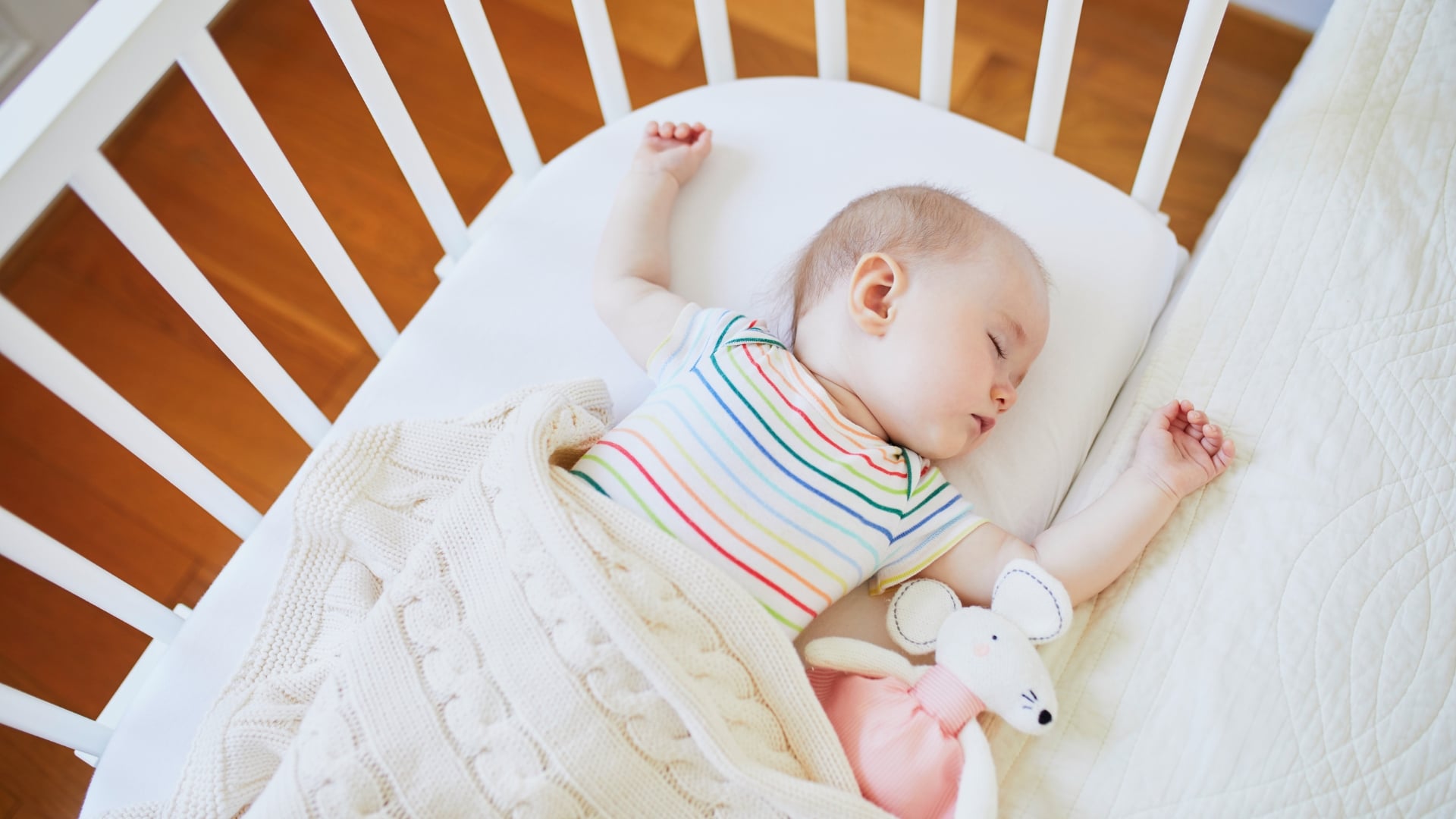
Table of Contents
Key Takeaways
- Room sharing (having baby sleep in the same room but separate sleeping space) is highly recommended for at least the first 6 months of a baby’s life to reduce the risk of SIDS (sudden infant death syndrome) and promote bonding.
- To make room sharing a success, establish a peaceful, consistent sleep routine and environment for baby by using white noise, keeping the room at an optimal temperature, and having dim lighting.
- Transition baby to their own room after 6-12 months when signs of independence emerge. Move siblings in together only after the baby is over 1 year and sleep trained. Use space-saving furniture, communicate expectations clearly, and maintain separate bedtime routines.
What Is Room Sharing?
Room sharing is when you and your baby sleep in the same room. Your baby should be in a crib, bassinet, or co-sleeper, as this is the safest way to sleep close to your baby during the early months. When your baby is a newborn you should have them within arm’s reach of you when in bed. But never in your bed.
Is Room Sharing The Same As Bed Sharing?
No, room sharing is not the same as bed sharing. Bed sharing is when parents sleep in the same bed as their baby. I do not recommend bed sharing as it carries a higher risk of suffocation.
How Long Should You Share A Room With Your Baby?
Room sharing can last anywhere from 6 months to a year, depending on what feels right for you and your baby.
I always feel that room sharing should be regarded as a special time that enhances the bonding experience and helps you get to know your baby better.
Having your new baby close during this time will also make night feeding easier as well as give you peace of mind that your baby is sleeping safely and soundly.
You can decide when to move your baby to their own room when they show signs of being more independent.
Looking to get your little one to sleep quickly and effortlessly? Check out my Bedtime and Nap Cheat Sheet and master the art of making daytime naps and bedtimes as seamless as possible.
A bedtime & nap cheat sheet so good your little one will ask you to put them to bed...
Laura Williams "This is a life saver! I'm so glad I downloaded your bedtime & nap cheat sheet. My little one actually asked me to put him to bed last night! Unbelievable! Thank you so much!"
Click Here For The FREE Cheat Sheet
My Top Tips For Room Sharing With Baby
Here are my top tips for preparing your sleep space for sharing with your little one to ensure it is a pleasurable and special experience.

- Create a Safe Sleep Space. Safety is of course paramount. Make space in your bedroom for a crib or bassinet that meets all safety standards and creates a safe sleep environment that ensures your baby’s comfort and reduces the risk of SIDS. If you start off using a bassinet or side sleeping crib, your baby may progress to a larger crib before they move into their own room. Make sure you keep an eye on your baby’s growth and know the signs to watch out for that indicate your little one is ready to make the move to a crib to keep them safe.
- Establish a Sleep Routine. Implementing a regular bedtime routine as early as possible will help your baby learn when it’s time to sleep. Repeat calm activities every night like reading books or singing lullabies to create strong sleep associations.
- Manage Noise Levels. Newborns will sleep through almost anything but as your baby grows up, you will need to keep the noise in their sleep space consistent and non-startling. One of the best ways to do this is to use a white noise machine to drown out background noise.
- Maintain An Optimal Temperature In Your Bedroom. Just like Goldilocks, your room must not be too hot or too cold. The ideal temperature for your baby to sleep comfortably is between 68-72°F (20-22°C). I usually recommend having a thermometer in the bedroom to take any guesswork out of whether the temperature is right. Use a fan to cool a room in summer and in winter keep the room warm by turning the radiators on. But remember, never put the crib close to a radiator.
- Consider a Room Divider. If space allows, as your little one grows you can use a room divider for privacy. This gives you and your baby separate spaces and can help with the transition to independent sleep as baby approaches their first birthday.
- Monitor Light Exposure. Depending on the time of year, you may find that dimming the lights as bedtime approaches will help you settle your baby to sleep. Using blackout curtains in the summer months can help prevent early morning light from waking your little one early too. Using a nightlight is also very beneficial as you will not have to turn on a light for night feeds.
- Be Aware Of Bed Sharing. Although, I do not recommend bed-sharing… if you do choose to bed-share, do so safely. Consult these guidelines to reduce risks. This includes lying on a firm mattress with no loose bedding.
- Use Multi-Purpose Furniture. If space is an issue then try and choose furniture that is multifunctional to maximize space. A changing table with drawers can store clothes and nursery essentials. You might consider using a portable crib as it can be moved around as needed, or folded up to make floor space during the day.
- Communicate With Your Partner. Before your baby arrives, it is important to discuss your expectations and schedules for nighttime situations. For example, if you are sharing night feeding… consider moving to another room to feed so your partner can sleep. Laying out your plan from day one will prevent misunderstandings and ensure you both get enough rest.
The most important thing is to remember what a special time this is for you and your baby and focus on the benefits of room sharing. Before you know it your little one will be ready to move to their own room and you will miss their company.
TOP TIP: Whatever crib you choose follow safe sleep guidelines. Keep pillows, blankets, and toys out of the crib. Ensure the room is well-ventilated and at the correct temperature.
Establishing Safe Sleep Practices When Room-Sharing
When you bring your newborn home, room-sharing is the safest and easiest way for you all to sleep. However, there are certain simple guidelines you should follow to ensure that you and your little one sleep soundly and safely:
- The safest position for your baby to sleep is on their back. Known as the “back to sleep” method, it’s essential for protection against SIDS.
- Your baby’s crib should have a firm mattress and a fitted sheet. Do not use pillows, blankets, or put any toys in the crib, as these can be hazardous and increase the risk of suffocation.
- Your baby’s crib should be close to your bed for ease of feeding and comfort. However, you must ensure it is away from curtains and cords, windows, or radiators.
- While naps in your arms are okay when you’re awake, always return your baby to their crib when you need to sleep. Contact naps should always be under your alert supervision.
- Stay informed by consulting your pediatrician about sleep training and safe sleep guidelines as your baby grows. They can provide tailored advice for your baby’s needs.
By establishing these practices, room-sharing can be a safe and beneficial option for you and your baby to cherish these early months.
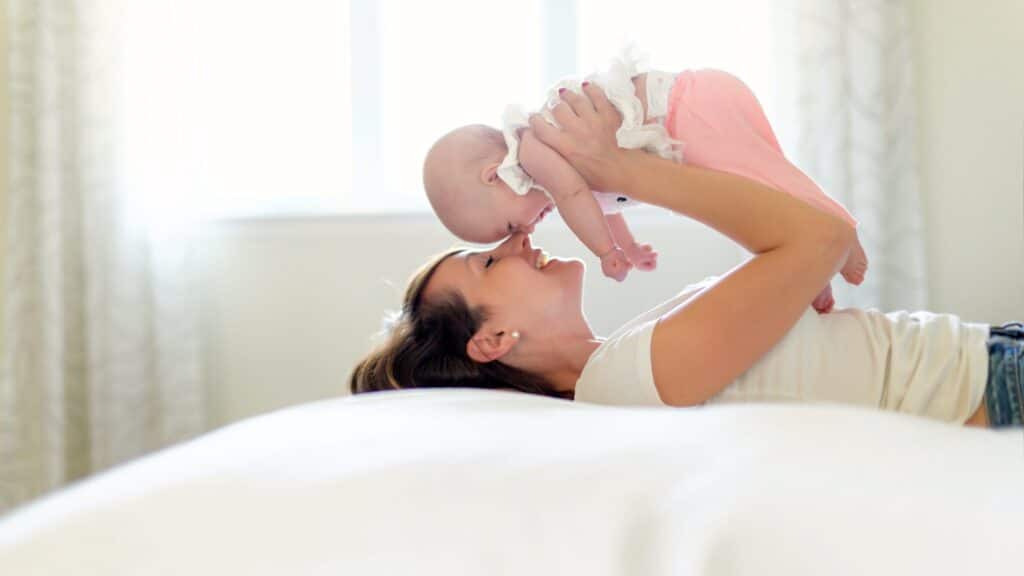
When Should You Stop Room Sharing With Baby?
Generally, I recommend room sharing for the first 6 months and from that point on it is entirely up to you as to when you wish to stop room sharing with your baby.
Having your baby sleep with you in the same room during the first 6 months will reduce the risk of SIDS, improve bonding, and of course give you peace of mind. And many parents will continue beyond 6 months for these very reasons.
The American Academy of Pediatrics recommends room sharing until the age of 1. But every family’s situation is unique and once your little one is 6 months of age, if you feel comfortable moving them to their own room, there is no real reason not to do so.
General Guidance On Room Sharing Duration
| Age | Guidance |
| 0-6 Months | Highly recommended to share a room, with baby in a separate sleeping space. |
| 6-12 Months | Room sharing can continue to provide benefits and security for the baby. |
| After 12 Months | Transitioning baby to their own room should probably be considered. |
When deciding when to move your baby into their own room consider your baby’s sleep patterns and your comfort levels. To learn more about moving baby to their own room, read this post.
Tips For Moving Baby Into An Older Siblings Room
We would all like to give our little ones their own room… but the truth is we don’t all have homes with rooms to spare.
And as moving your baby into their own room is a big move for most parents anyway… having to settle them in with an older sibling can feel very daunting.
If you are planning on your children sharing a room, I would not recommend moving them in together until your youngest is at least 1 year old.
Older siblings have a habit of putting toys, blankets, and cushions into a younger sibling’s crib and this would not be safe for your baby under a year old.
To help move your baby into an older sibling’s room without ruining everyone’s routines and sleep habits, here are my top tips:
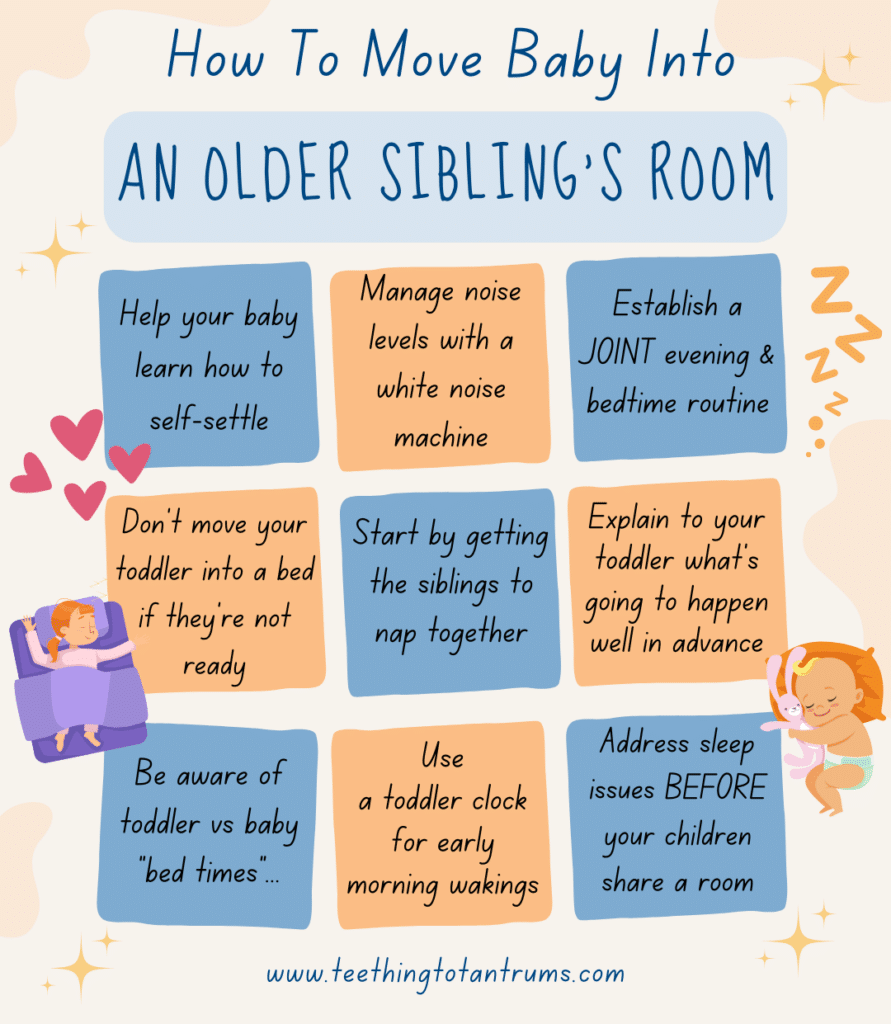
- Encourage your baby to learn to self-settle before moving them in with their older sibling
- Use a white noise machine to reduce the chance of them disturbing each other.
- Establish a solid and recognizable JOINT bedtime routine before you make the move. Let the older sibling help your younger baby get ready for bed.
- Don’t be tempted to move the older child into a bed if they are not developmentally ready. If you only have space for one crib in the room, your baby will have to share with you until the older sibling is old enough to be transitioned into a big bed.
- Try getting your children to nap in the same room before embarking upon joint nighttime sleep.
- Explain to the older child well in advance about what is going to happen. And keep them included in the process! Your older child can help choose new bedding for their sibling and choose a new toy for themselves.
- Be aware of individual routines. Whilst doing the bedtime routine together will be a lifesaver for you… Siblings do not need to have the same bedtime. What I suggest is to put the younger child to bed first and then give your older child some one-on-one special time before saying good night.
- Use a toddler clock for early morning wakings and explain to your older child that they should not wake their younger sibling and should be quiet and stay in bed until it is time to get up. Having sleep rules will make room sharing with a sibling go more smoothly.
- Address sleep issues BEFORE you get your children to share a room. I always recommend that you address any sleep issues before putting your little ones in the same room. Having two good sleepers before you make the transition will certainly help and sleep training one while the other is trying to sleep will not be easy.
Frequently Asked Questions About Room Sharing With A Baby
Looking for more information and tips for room sharing with baby? You’re in the right place! Here are the most frequently asked questions about room sharing with a baby.
Q: Room sharing with a toddler… can it work?
A: If you do not have the space to move your toddler into their own room, I recommend maintaining a solid bedtime routine and setting clear boundaries. Use room dividers to create personal space, be calm during night wakings, and ensure your toddler knows that bedtime means bedtime.
Q: What are safe sleep practices for toddlers and babies sharing a room?
A: Place babies on their backs in a crib with a firm mattress. Keep soft bedding and toys out of their space. If you are putting your baby and toddler in the same room use a room divider to help your toddler sleep and feel like they have their own space, use a white noise machine to limit noise disruption, and use a night light so that you can move around the room without disturbance.
Q: What are some space-saving ideas for a baby and a toddler sharing a small room?
A: To save space in a room, use multifunctional furniture like a crib with drawers, a shelving unit that can hold toys and supplies, or a chest of drawers that can double up as a changing station.
Q: How long is it recommended to share a room with your baby?
A: Room sharing for at least six months is beneficial and can reduce the risk of SIDS. However, lots of families will continue to room share until baby is 1 year of age.
Q: At what age is it appropriate for babies to start sharing a room with an older sibling?
A: I recommend waiting until baby is 1 year old to share a room with a sibling… just in case your older child decides to put blankets and toys in your baby’s crib.
Need More Parenting Help?
- Download our FREE Perfect Sleep Cheat Sheet. It’s a free, easy-to-use and proven formula designed for parents of 0-5 year olds to master the art of consistently undisturbed and restful sleep without the yelling, nagging or exhausting long-winded evenings.
- Check out our Parenting Toolbox. You’ll get access to expertly-chosen products that you can guarantee are the best for your little one and your wallet.
- Ready to create the calm, peaceful evenings you deserve? Then checkout our most popular course - The Bedtime Battles Masterclass

A bedtime & nap cheat sheet so good your little one will ask you to put them to bed...
Laura Williams "This is a life saver! I'm so glad I downloaded your bedtime & nap cheat sheet. My little one actually asked me to put him to bed last night! Unbelievable! Thank you so much!"
Click Here For The FREE Cheat Sheet

